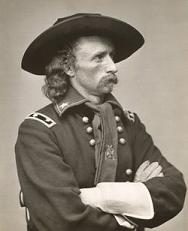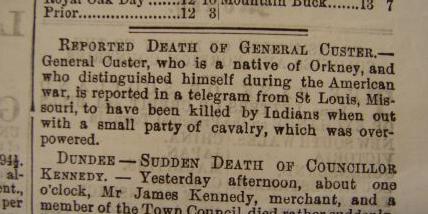

| Home Contents Contact |
|
|
This theory is no modern departure. One specific instance appears in the Edinburgh Evening Courant, 26th July 1867. An article, reporting on a despatch pertaining to one of his latest Indian skirmishes, makes a startling reference to ‘General Custer, who is a native of Orkney’. This is an extremely dubious proposition but it does highlight the fact that the hypothesis did at one time hold a certain local currency.

It is generally accepted by Custer historians that he was descended from 17th century German immigrants by the name of Kuster. However, there is an alternative school of thought, according to which the surname is actually a corruption of the Orcadian surname ‘Cursiter’ - pronounced locally as ‘Custer’.

There are multiple documented instances of bearers of the Cursiter surname who have believed, in all apparent sincerity, that Custer of Little Bighorn fame was a relative of theirs. At the epicentre of the theory lies the last Cursiter proprietor of Binscarth, an ancient farm in the Parish of Firth, two of whose sons went out to America. Settling in New York City, they ran a prosperous paper mill but went west after it was destroyed by fire. It has been assumed in certain quarters that one of the brothers, William, was the ancestor of George Armstrong Custer.
Reference might usefully be made to Peter Russell, of Men With Custer UK. Peter has researched the story over a considerable number of years and has made a powerful contribution to the quest for the true position.
I raised the issue with Kim Foden and she was able to confirm that as a child growing up in the islands, she was aware of a prevalent local tradition that Custer came from a local background.
This may be the reality, or just yet another of the many myths surrounding ‘General’ Custer, but either way I’ll leave the final word on the subject to Kim:
Here in Orkney there are those who say Custer was from Orkney, had cousins here, had no connection to the islands, and those who wish Orkney to disown him completely!


